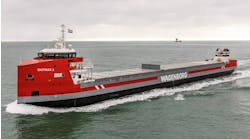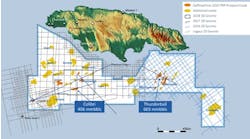The evaluation and diagnosis of under-performing wells and the appropriate solutions to enhance production are important elements for optimizing prod-uction during the present high oil price environment. Once an evaluation of an under-performing well is made, diagnostic tools are utilized to determine the best and most cost-effective treatment to increase production.
These tools include well optimization software to conduct an economic evaluation and risk analysis for treatments to enhance and optimize production of the field. Production enhancement services and the technical expertise to apply those services to the under-performing field are also utilized.
Schlumberger's Production Enhancement Group (PEG) was formed to link operators with companies that provide essential services during the life of a well. The group comprises interdisciplinary teams of experts who identify under-performing wells, conduct an economic and risk analysis, and recommend the best treatments to enhance production from those wells. The group also takes a proactive approach to identify potential problems before they occur.
History
The first integrated PEG team was created in North America in 1993. The group built upon its North American experience to introduce the concept in South America in late 1993 in eastern Venezuela, solving the problem of diminished production from several wells in the North of Monagas field.
The group joined with Corpoven to evaluate a number of wells, eventually solving sand production and asphaltene flocculation problems. Field production increased by 250% at a cost of only 5% of drilling a new well.
The group is now working in Venezuela with Petroleos de Venezuela S.A. (PDVSA), but this time a modified program, dubbed PEG Mentor, will be used. It includes the transfer of technology to PDVSA engineers via a 16-week course. Each course is addressed to 15 PDVSA engineers who have responsibility for enhancing production of a particular field. The first course includes 10 fields.
The PEG team will train PDVSA engineers in production enhancement methodologies to develop production optimization programs in each field. Each course will include, among other items, training in the use of well optimization software, economic evaluation and risk analysis, and technologies for production enhancement.
Depending upon the problem, various PEG team members with the appropriate expertise will be called upon to provide mentoring and solutions, not only helping the PDVSA engineers realize a quicker solution, but also helping them to recognize that solutions are available.
With the PEG Mentor program, field production enhancement expertise is being transferred to PDVSA and incorporated into its culture. Three PEG Mentor courses are scheduled for 2000, training 45 PDVSA engineers. PDVSA plans for at least 300 of its engineers to be trained during the next three years.


